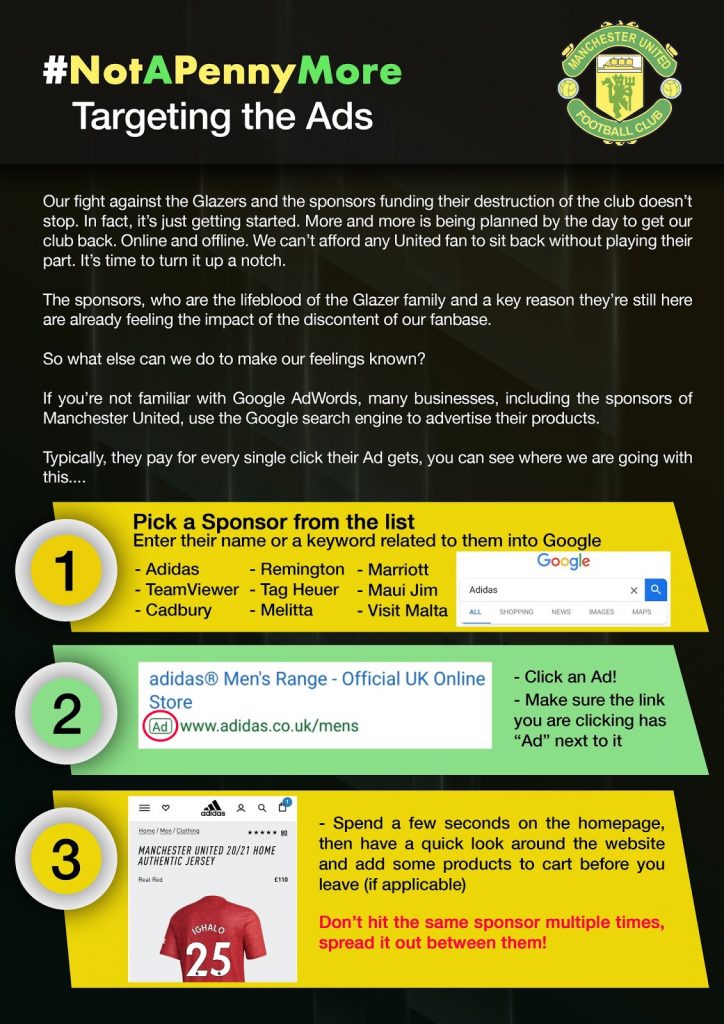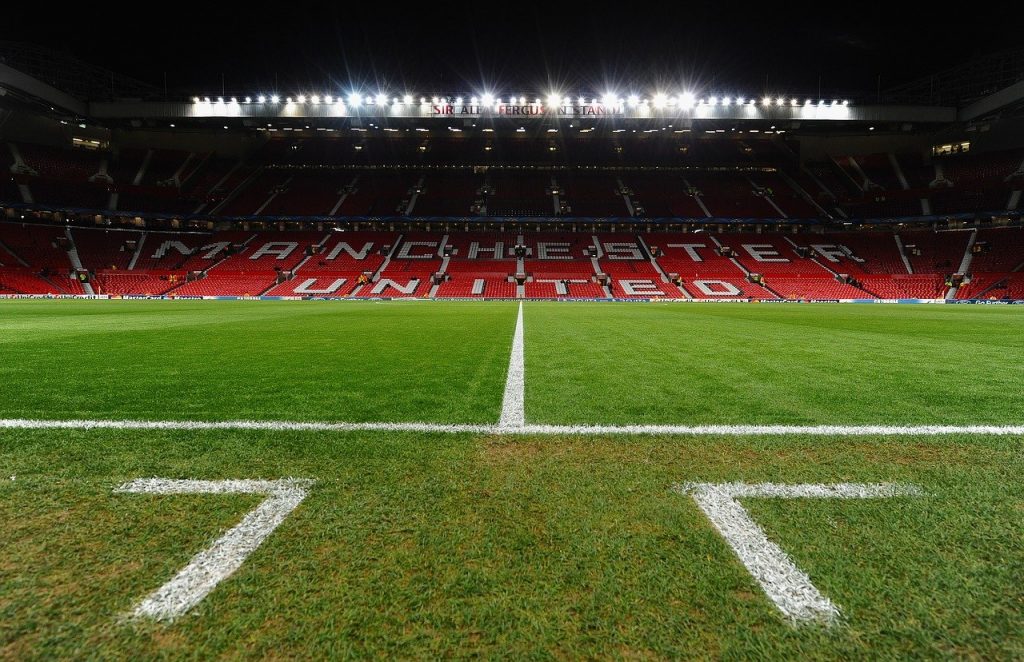Football, also known as soccer, is the most popular and followed sport in the world. In fact fans of major football clubs are some of the most passionate and engaged brand ambassadors anywhere in the world. So it’s easy to see why major corporations are happy to pay big money to get their ads seen on football shirts and in stadiums.
However this approach may have backfired recently with fans of Manchester United, one of the world’s biggest football clubs, running their #NotAPennyMore campaign. One of the key factors in this campaign is targeting sponsors of the club with organised click fraud in an attempt to stop their sponsorship.
But why?
Grass roots to corporate powerhouses
With their roots in the local community, most sports clubs were set up to represent the city or area where they’re based. But with the growth in global broadcasting, corporate sponsorships have become ever more valuable, with some paying multi-million packages to be associated with clubs like Real Madrid and Manchester United or, in the US, American football clubs like the Dallas Cowboys.
Modern sports clubs are run like corporate entities, with a high value product which sits firmly in the public eye.
The Glazer Family first became involved with Manchester United in the 2000s, and courted controversy from the start, with regular protests by the fans against the Glazers since then.
But it’s a recent attempt to set up a breakaway football league in Europe, the European Super League, that has reignited tensions between fans and owners of major clubs. The result has been fan protests against the clubs involved and, in the case of Man Utd, this seems to have been the straw that broke the camel’s back.
Outraged Man Utd fans have been orchestrating a campaign to click on sponsor’s ads in an attempt to damage funding for the Glazer family who own the club. Their Twitter feed even features step by step instructions on how to conduct click fraud and their targets.

Companies currently in the firing line include:
- Adidas
- Aon
- Chevrolet
- TeamViewer
- Cadburys
- Marriott
- Tag Heuer
- Remington
- Visit Malta
- Melitta
- Maui Jim
Manchester United have around 50 sponsors, mostly larger entities. But the Boycott Glazers Twitter feed even contains direct links to Google searches which trigger ads for fans to easily click away.
What does this mean for the sponsors?
Mediaworks, a UK based advertising agency, have found that the number of mentions of the Twitter campaign has rocketed.
Stats suggest that the #NotAPennyMore hashtag was mentioned around 7000 times in one day at it’s recent peak. Searches in the UK that trigger ads for sponsor brands have also doubled in the same time.
Brett Jacobsen, CEO and founder of Mediaworks, noted that, “…it’s very easy to see how this could very quickly start costing Manchester United’s sponsors a lot of money. This could easily run into sums comfortably into the millions.
“We’ve already seen one major sponsor pull back from a new deal this week and this move by the fans to light the match on some digital dynamite as a means to remove the Glazer family as owners of the club has every possibility of having the desired effect.
“There could be some very awkward boardroom conversations between United and their sponsors if this plays out as the fans hope.”
In short, this very public and organised click fraud campaign against Manchester United highlights how the ordinary people can kick corporations where it hurts.
In fact, to date, the campaign is thought to have cost sponsors around GB£1.2 million. Although this is a drop in the ocean for sports clubs like Manchester United, it does seem to have had the desired effect.
As well as clicking on ads, fans are also encouraged to add items to shopping baskets to mess with the analytics and even to cause stock to show as unavailable.

Playing dirty or a level playing field?
Sports fans often have close relationships with their clubs, with supporters associations having input into club matters. But the increased reliance on sponsorship has led to increased alienation for many loyal fans, from the English Premier League to sports clubs further afield.
So is this trend of organised click fraud an isolated incident? Or could we expect to see more of the same in the coming years?
The truth is that this is a crudely effective way for people to lash out at something that they see as unfair. To the clubs and the sponsors, this might seem like a kick below the belt, but to the fans it’s a way of letting the boardroom know that they’re not happy.
Sports fans are, by nature, a tribal bunch who will happily rally around a common cause.
And with social media making it easier than ever to orchestrate campaigns like this, it’s unlikely we’ve seen the last example of fan managed click fraud.
More than just the big boys
Another problem is that the search for the main keywords doesn’t just activate the main brand name. Companies associated with the sponsors might be stockists, distributors, partners or agents whose ads may trigger as a result of this kind of campaign.
For example, a search for Tag Heuer, Maui Jim or Melitta Coffee Machines brings up results for businesses that have nothing to do with the main campaign.
This presents a problem that overzealous protesters are just as likely to click on these unrelated companies’ paid links as they are on the main sponsor.
In short, anyone bidding on related keywords related to the sponsor’s products might also fall foul of click fraud.
Could sponsors prevent click fraud?
The instructions on the #NotAPennyMore Twitter do highlight how to cause more damage by not hitting the same sponsor multiple times but, ‘spreading it out between them’.
Zack Shipman, senior consultant at ClickCease says, “This kind of activity from genuine human users is exactly the kind of thing that gives digital marketers headaches. There are always brand haters who want to click your ads, and separating those from the genuine visitors is something that algorithms usually find hard to do.
“But there are ways you can track user behaviour to understand if people are clicking your ads with malicious intentions, or just to annoy you”.
So is it realistic to block these kinds of orchestrated click fraud?
For businesses using ClickCease, there are a number of ways it’s possible to monitor and block these kinds of fraudulent clicks.
1. Click threshold – The custom settings allow advertisers to set the number of times an ad can be clicked in a set period of time. For example, if a search for a high risk keyword is triggered multiple times in fifteen minutes you can set the click to be blocked in future.
2. Session recordings – ClickCease is the only click fraud prevention software which offers a recording of site visitors. By watching activity on these clicks you can understand if they were a genuine visitor or if you need to block them from clicking again.
3. Geo exclusions – Another way of blocking clicks is to block clicks from a specific area. For example if you’re running a national or international campaign and you know that Manchester United Fans are clicking ads intentionally, you may wish to block the entire city for a few days. Of course sports teams have an international appeal, so this may only partly limit your exposure, while at the same time cutting your ads in a large city.
Zack adds, “We use a number of filters to identify genuine intent in each click, such as how long they’re staying on the page, if they’re a repeat visitor, what device they’re using.
“Although ad fraud and click fraud are often painted as the fault of bots, there are a number of behaviours that can flag up a potentially fraudulent visit from humans which you can then block”.
ClickCease also flags up search volume on your keywords, so if you spot that something isn’t quite right you can also hit the pause button on your campaigns or look closely at your exclusions rules.
The bottom line
The #NotAPennyMore campaign highlights the fact that click fraud is no longer a niche concern. In fact it just shows how consumers are aware that they have the power to cause businesses pain through their marketing budgets.
Although in this instance it’s football fans, in the future it’s possible that click fraud protests could occur for a whole host of reasons.
With ClickCease you’ll be able to stay on top of the activity on your ads, and stay ahead of the trends in click fraud.
Sign up for your free trial today.
